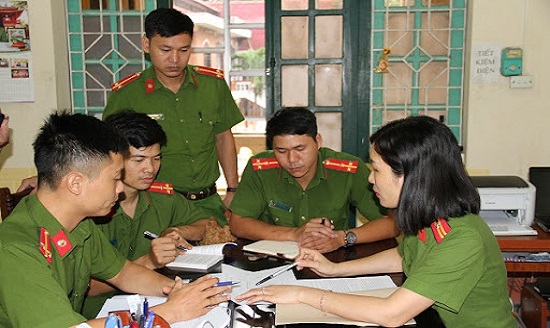What are the prohibited acts of investigators and investigation officers in Vietnam?
What are the prohibited acts of investigators and investigation officers in Vietnam? – Tien Dung (Da Nang)

What are the prohibited acts of investigators and investigation officers in Vietnam? (Internet image)
Regarding this issue, LawNet responded as follows:
What are the prohibited acts of investigators and investigation officers in Vietnam?
According to Article 6 of Circular 126/2020/TT-BCA, prohibited acts of investigators and investigation officers in Vietnam include:
- Investigators and investigation officers shall be prohibited from performing the acts specified in Article 54 of the Law on Organization of Criminal Investigation Agencies 2015, specifically:
+ Things prescribed by law not to be done by cadres, civil servants or officers and soldiers of the people’s armed forces.
+ Provision of consultancy to arrestees, persons held in custody, the accused, defendants, involved parties or other procedure participants, thereby making the settlement of cases or matters unlawful.
+ Interference in the settlement of cases or matters or abuse of their influence on persons in charge of settlement of cases or matters.
+ Bringing case files or documents out of their offices not for the assigned tasks or without approval of competent persons.
+ Reception of the accused, defendants, involved parties or other procedure participants involved in cases or matters under their settling jurisdiction outside prescribed places.
- In the course of performing assigned duties, investigators and investigation officers shall be excluded from the following acts:
+ Arbitrarily receiving and handling criminal information, complaints and denunciations or accusations in breach of the regulations, or despite heads or deputy heads of investigation agencies have not assigned them to do so; arbitrarily conducting investigation activities without due regard to investigation plans approved by heads or deputy heads of investigation agencies;
+ Adding, removing, modifying, fraudulently swapping, destroying or damaging documents, objects or exhibits involved in cases, or using other schemes to falsify criminal case contents;
+ Meeting accused persons, their relatives, litigants or other participants in legal proceedings outside the Police’s offices, except if such meeting is necessary and allowed by heads or deputy heads of investigation agencies;
+ Having a meal or drink with, receiving money, property or other benefits from, accused persons, their relatives, litigants or other participants in legal proceedings.
+ Abusing investigation functions to meet accused persons, their relatives, litigants or other participants in legal proceedings, entities or organizations involved, ask for their help, harass or demand benefits from them in any form;
+ Extorting depositions from suspects, put words into suspects’ mouth or torture them in any form;
+ Disclosing secrets, information, documents or records related to cases or matters under investigation or examination without permission in any form to unauthorized persons.
In cases where information is needed, written petitions must be filed to seek consents from heads and deputy heads.
+ Allowing persons being held in custody or detention to use their phones or other means of communication to communicate with other people (including those inside and outside detention camps or centers), except in special cases where it is obligatory to seek written consents from heads or deputy heads of investigation agencies that are handling cases or matters to meet investigation demands.
+ Putting participants or citizens in any inconvenience by keeping them waiting and travelling a lot;
Who are the investigators, investigative officers?
(1) Investigators
Investigators are persons appointed to perform the criminal investigation task.
Investigators are divided into the following grades:
+ Primary investigators;
+ Intermediate investigators;
+ Senior investigators.
(Article 45 of the Law on Organization of Criminal Investigation Agencies 2015)
(2) Investigating officers
Investigating officers of the investigating bodies are prescribed as follows:
- Persons who fully satisfy the criteria prescribed in Clauses 1, 2, 3 and 5, Article 46 of the Law on Organization of Criminal Investigation Agencies 2015 may be appointed as investigating officers to assist investigators in conducting a number of criminal investigation activities;
- The appointment and relief from office of, and grant and revocation of certificates to, investigating officers in the People’s Public Security shall be prescribed by the Minister of Public Security, in the People’s Army by the Minister of National Defense, and in the Supreme People’s Procuracy by the Procurator General of the Supreme People’s Procuracy;
- They shall perform the tasks and exercise the powers prescribed by the Criminal Procedure Code and this Law.
(Clause 1, Article 59 of the Law on Organization of Criminal Investigation Agencies 2015)
- Key word:
- investigators
- investigation officers
- in Vietnam
- Cases of land rent exemption and reduction under the latest regulations in Vietnam
- Economic infrastructure and social infrastructure system in Thu Duc City, Ho Chi Minh City
- Regulations on ordination with foreign elements in religious organizations in Vietnam
- Increase land compensation prices in Vietnam from January 1, 2026
- Determination of land compensation levels for damage during land requisition process in Vietnam
- Who is permitted to purchase social housing according to latest regulations in Vietnam?
-

- Emergency response and search and rescue organizations ...
- 10:29, 11/09/2024
-

- Handling of the acceptance results of ministerial ...
- 09:30, 11/09/2024
-

- Guidance on unexploded ordnance investigation ...
- 18:30, 09/09/2024
-

- Sources of the National database on construction ...
- 16:37, 09/09/2024
-

- General regulations on the implementation of administrative ...
- 11:30, 09/09/2024
-

- Notable new policies of Vietnam effective as of ...
- 16:26, 11/04/2025
-
.Medium.png)
- Notable documents of Vietnam in the previous week ...
- 16:21, 11/04/2025
-
.Medium.png)
- Notable documents of Vietnam in the previous week ...
- 16:11, 02/04/2025
-
.Medium.png)
- Notable new policies of Vietnam to be effective ...
- 16:04, 02/04/2025
-
.Medium.png)
- Notable new policies of Vietnam effective from ...
- 14:51, 21/03/2025
 (1).png)
 Article table of contents
Article table of contents
